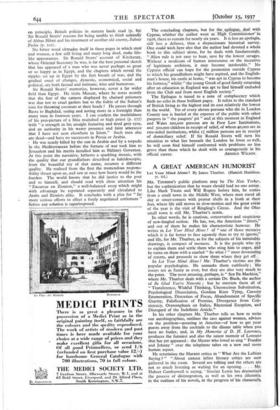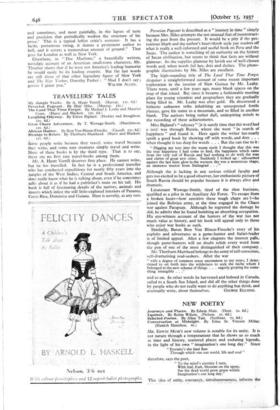A GREAT AMERICAN HUMORIST
MR. THURBER'S public platform may be The New Yorker, but the sophistication that he wears should lead no one astray. Like Mark Twain and Will Rogers before him, he conies from a small town in the Middle West, where men stand all day at street-corners with peanut shells in a froth at their feet, where life still moves in slow-motion and the great event of the year is the visit of Ringling's Circus. And the Ohio small town is still Mr. Thurber's norm.
In other words, he is cautious, conservative and suspicious of new-fangled notion. He has, too, the American "jitters," and out of them he makes his characteristic humour. He writes in Let Your Mind Alone ! of "one of those menades which it is far better to face squarely than to try to ignore;" and life, for Mr. Thurber, as for the subjects of his inimitable drawings, is compact of menaces. It is the people who try to explain them and settle them who sting him to anger, and he turns on them with a snarled "So what ? "most devastating of retorts, and proceeds to show them where they get off. , In Let Your Mind Alone ! Mr. Thurber's victims are the popular psychologists. He unmasks them ruthlessly ; the essays are as funny as ever, but they are also very much fo the point. •The most amusing, perhaps, is " Sex Ex Machina'," where Mr. Thurber deals with a certain Dr. Bisch, the author of Be Glad You're Neurotic ; but he convicts them all of "Transference, Wishful Thinking, Unconscious Substitution, Psychological Dissociation, Gordian Knot Tying, Cursory Enumeration, Distortion of Focus, Abandonment of Specific Gravity, Falsification of Premise, Divergence from Con- sistency, Overemphasis on Italics, Rhetorical Escapism, and Disregard of the Indefinite Article."
In his other chapters Mr. Thurber tells us how to write our autobiographies, outlines the case against women, advises on the problem—pressing in America—of how to get your guests away from the cocktails to the dinner table when you have no .butler, and, in My Memories of D. H. Lawrence, produces the funniest and also the sanest memoir of Lorenzo that has yet appeared : the Master who loved to sing " Frankie and Johnny" over the telephone takes on a new and more human aspect.
He scrutinises the Marxist critics in "What Are the Leftists Saying ? " "About sixteen leftist literary critics are now gathered in the room. Several are talking and the others are not so much listening as waiting for an opening. . . . Mr. Hubert Camberwell is saying, 'Sinclair Lewis has dramatised the process of disintegration, as well as his own dilemma, in the outlines of his novels, in the progress of his characters, and sometimes, and most painfully, in the lapses of taste and precision that periodically weaken the structure of his prose.' This is a typical leftist critic's sentence. It has a facile, portentous swing, it damns a prominent author to hell, and it covers a tremendous amount of ground." That goes for London as well as New York. • Elsewhere, in "Doe Marlowe," a beautifully written, nostalgic account of an American small-town character, Mr. Thurber shows that if he were not America's leading humorist he would easily be its leading essayist. But the last words are still those of that other legendary figure of New York and The New Yorker, Dorothy Parker : "Mad I don't say ;























































 Previous page
Previous page